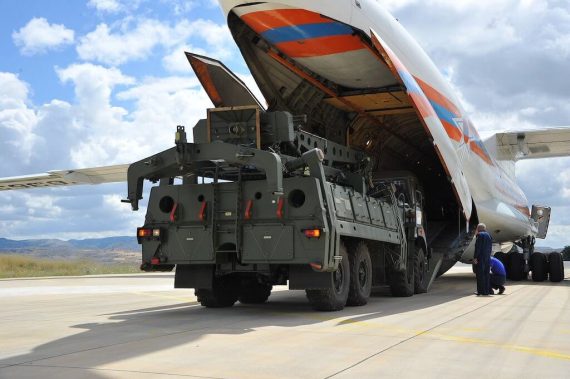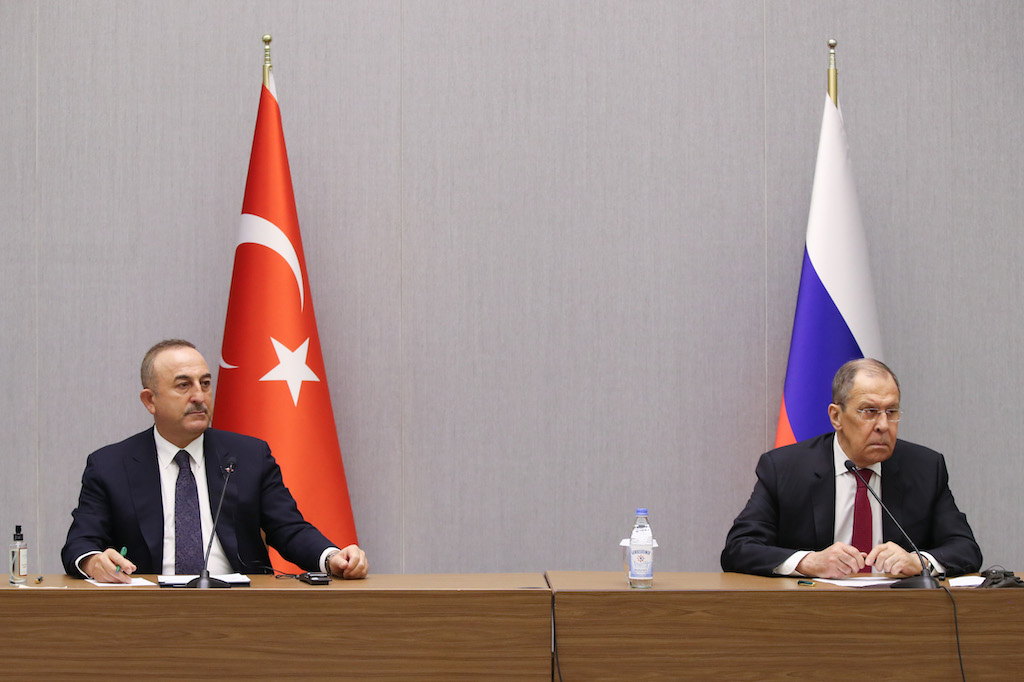Sour candy is a joy that creates two different sensations in the mouth: the mini explosion of the sourness is one, but so is the expectation of sweetness. The multiple layers of flavors and conflicting tastes, in other words, can either challenge or encourage one’s sensory experience and appetite.
It occurred to me that this was a great analogy for the current relations between Turkey and the United States, two countries with a complex political history and whose relations are replete with contradictions. The latest CAATSA decision by the U.S. government became another sensory explosion in the mouth – it is still hard to decide whether to consume such a candy or reject it altogether.
The U.S.-Turkey relations have deep roots. History indicates continuous fluctuations, ups and downs which are not peculiar to recent times. Decisions such as the CAATSA sanctions cannot be judged in a vacuum but must be incorporated into a post-structural reading of the U.S.-Turkey relations.
It is for certain that the Turkish image in U.S. thinking, and vice versa, is an accumulation of prejudices, narratives, and the influence third parties. Hence, this article will take these three dynamics as parameters to delve into the issue in question.
The U.S.-Turkey relations go back to the Ottoman era; the foundation of the Turkish Republic can be taken as the datum point. World War I seems to be the initial departure with with Woodrow Wilson’s Fourteen Points and their impact on the fate of the Ottoman Empire and the new republic.
The interwar period saw the restructuring and rehabilitation that levelled Turkey up to a Western-type nation-state. The disinterest of the U.S. in global politics, the Great Depression, and World War II were concurrent factors, the natural outcome of which was for Turkey to fight against Germany and on the side of the Allies.
The Cold War, on the other hand, achieved what could not be achieved during World War II and up to its end in 1945. Turkey joined the Western world, become a member of NATO, and contributed to the containment of the Eastern Bloc.
The intense U.S. political, economic, and military presence in Turkey challenged the USSR with an outcome of asymmetric warfare inside Turkey in the form of political polarization. Meanwhile, the problems, not addressed properly after two world wars, pushed Turkey to express demands using a low profile so as not to damage the spirit of friendship during the Cold War years.
The Turkish expectation was for the alliance to observe Turkey’s sovereign rights over the islands not delegated to Greece by the treaties, and to recognize the Turkish Cypriots as a community with equal rights to Greek Cypriots. The U.S. attempted to balance the challenges of the alliance at the expense of Turkish demands and interests through silencing both Turkey and the Turkish Cypriots.
As the attacks of Greek nationalist networks targeted the Turkish community in Cyprus, resulting in massacres, Turkey started a peace enforcement operation but found itself faced with U.S. sanctions, similar to today’s CAATSA sanctions.
If Turkey’s intervention in Cyprus is taken as a case study, the parameters identified above can be used to portray the scope of the U.S.-Turkey relations. The objective of the United States was to stick to the status quo and not to disrupt the rivalry with the USSR – in so doing, it refused to relinquish its set ideas and prejudices regarding Turkey.
If Turkey’s intervention in Cyprus is taken as a case study, the parameters identified above can be used to portray the scope of the U.S.-Turkey relations.
Turkey, with a poor economy and no military strength, could be a pivot against the Eastern Bloc but could not move in a direction on its own. The political narratives of the time envisioned Turkey with its geostrategic prominence as the cornerstone of the fight against any communist expansionism.
The third-party inputs were designed to perpetuate the status quo in the alliance. For instance, the lobbying efforts of the Jewish community aimed to balance the Greeks and Armenians against Turkey. The Israeli-Arab Wars required a passively positioned Turkey in the Middle East for the safety of Israel, which enjoyed the support of the U.S. Senate.
The end of the Cold War created a new political environment and drove the U.S.-Turkey relations towards a new path. The U.S. was interested in consolidating its prosperity, reducing its global presence, and implementing crisis management measures to respond to the collapse of the USSR, but all within the frame of international organizations. Hence, Turkey was given a small role in this scheme and designated a reduced geostrategic importance.
Such an attitude had reflections on Turkey’s internal problems because the country’s major threat was terrorism and the allies were short of offering support apart from denouncing terrorism on principle. NATO defined the overall course of relations, while the Bosnian and the Caucasus conflicts, as well as the occupation of Iraq bestowed further validity to Turkey’s position in the alliance.
Hence, the U.S. continued to support Turkey’s counterterrorism operations by arms sales. Meanwhile other political blocks emerged such as the European Union, whose overall strategy was to have Turkey waiting at the doors of the union with the centuries-old slogan “Turkey is ‘in’ Europe, but not ‘of’ Europe.”
The 9/11 attacks and their aftermath quintessentially reflect the described feeling of sour candies with devastating challenges that have led to the current status of the relations. Turkey has actually long been a country sternly fighting radicalism inside and outside of its borders.
Turkey was – and still is – supportive of the US in its quest to defeat terrorism; a struggle that Turkey has been experiencing for decades.
For instance, the Iranian Revolution, with its quest to spread the teachings of Khomeini, was perceived as a threat only in Turkey as opposed to the other members of the NATO alliance. Al Qaeda’s 9/11 attacks shook the Western world while igniting the processes of Islamophobia, the hawkish transformation of conflict conceptualizations, and the solidified interventions in Afghanistan and Iraq.
Turkey was – and still is – supportive of the U.S. in its quest to defeat terrorism; a struggle that Turkey has been experiencing for decades. But the intervention in Iraq was a challenge to the relations on the government level in so far as the Turkish parliament denied the United States Army access to Turkish territory and bases for the purpose of invading Iraq.
The 9/11 attacks and their aftermath quintessentially reflect the described feeling of sour candies with devastating challenges that have led to the current status of the relations. Turkey has actually long been a country sternly fighting radicalism inside and outside of its borders.
For instance, the Iranian Revolution, with its quest to spread the teachings of Khomeini, was perceived as a threat only in Turkey as opposed to the other members of the NATO alliance. Al Qaeda’s 9/11 attacks shook the Western world while igniting the processes of Islamophobia, the hawkish transformation of conflict conceptualizations, and the solidified interventions in Afghanistan and Iraq.
Turkey was – and still is – supportive of the U.S. in its quest to defeat terrorism; a struggle that Turkey has been experiencing for decades. But the intervention in Iraq was a challenge to the relations on the government level in so far as the Turkish parliament denied the United States Army access to Turkish territory and bases for the purpose of invading Iraq.
After the March 1 Resolution of the Turkish Grand National Assembly, the U.S.-Turkey relations steadily worsened. Meanwhile, there is an interesting aspect of the voting in the assembly that deserves attention. Those who voted against the U.S. plan to use Turkish territory to invade Iraq are now on the same side of the U.S. and the Turkey’s political parties then voted against the proposed plan.
This break soured the bilateral relations in Iraq and Syria in the long term while the joy of cooperation and partnership remained steady in terms of strategic communications. The straw that broke the camel’s back came after and ultimately devastated the long history of the U.S.-Turkey relations.
The common perception in Turkey is that the U.S. encouraged the July 15 military coup attempt by FETO in 2016, and that the U.S. collaborates with the PKK-affiliated terror networks in Syria at the expense of the integrity and security of its ally, Turkey.
Recommended
Turkey’s reaction to the concrete and hostile U.S. acts was to mend relations with Russia since Russia has become part of the reality of the Syrian theater after the U.S. directed its efforts to the PKK/PYD to counter DAESH rather than the Turkish- (and once U.S.-) backed Free Syrian Army. Hence, the polarization of the allies in Syria is an outcome of the U.S. policies that are in conflict with Turkish interests.
This discourse led to the re-assessment of the relations based on the attitudes of both parties and resulted in an embargo of arms sales to Turkey in order to limit Turkish military operations. Nevertheless, Turkey’s attempt to procure advanced weapon systems, with technology transfers, was not met with any responses by the NATO allies and concluded with the S-400 purchase from Russia.
Turkey’s purchase of the S-400 defense missile systems cannot be viewed as an isolated issue but must be understood as a part of Turkey’s overall defense objectives. So far, embargoes have encouraged Turkey to produce domestic weapon systems with complex technologies.
Turkey’s decreasing dependency on Western defense companies is creating a concern among its NATO allies. The primary objective of Turkey’s NATO allies seems to be to slow down Turkey’s military activism and its independent policy-making by harming its defense industries. Another issue is the Turkish defense industry’s competitive capacity in the global arms market since Turkey does not condition any weapons sale and offers competitive pricing.
The U.S. decision to implement CAATSA measures against Turkey serve to deter Turkey and other countries with similar intentions from entering the arms market or procuring Russian weapons.

VIDEO: Turkey’s Defense Industry Making Huge Strides
Prejudice is now better established in the United States and this is fueled by the escalating Islamophobia and extremism. Strategic partnership and long-lasting friendship narratives continue but have been seriously damaged.
The U.S. government continues its support to the YPG, the Syrian branch of the PKK terrorist organization. The Jewish lobby is now aligned with the Greek and Armenian lobbies which together paved the way for CAATSA-like sanctions on Turkey.
The Biden administration’s attitude will be decisive for the future course of the U.S.-Turkey relations. The question is whether both parties can compromise on certain issues. The Turkish perspective is crystal clear: the U.S. must stop providing support to Turkey’s enemies. Only then, the problems can be addressed promptly and successfully.
Otherwise, “a low profile, indirect but sustainable” conflict model can be the modus operandi of the coming administration. Well, both countries can talk and shake hands, but prejudices and third parties are preventing this from happening. Meanwhile, measures such as the CAATSA sanctions do not promote a partnership but only serve to deepen the crisis.






